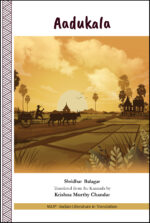Krishna Murthy Chandar taught English at the University of Mysore for more than three decades. He has published four collections of short stories, five plays, and two novels in Kannada and has translated more than five Kannada fictional works into English. His collection of short stories, Asmite, won the Kannada Sahitya Parishat Award (2021). His translation of Prof Kirtinath Kurtkoti’s Uriya Nalige into English, titled The Flaming Tongue, won the Karnataka Sahitya Akademi Award (2010). His translation of Sri K V Subbanna’s critical essays, titled Kavirajamarga and the Kannada World, won the Karnataka Sahitya Akademi Award (2022).
His recent translations include K P Poornachandra Tejaswi’s Kannada novel Mayaloka and Chandrashekar Kambar’s collection of folk tales, Savadatti Yellamma and Other Folk Tales. His novel Kanchana Seetha has been translated into Tamil and Telugu. He has also published five collections of essays in literary criticism, both in English and Kannada.
-
Aadukala
₹300.00Author: Shridhar Balagar Translator: Krishna Murthy Chandar
Aadukala is an exceptional work that documents tribulations, tragedies, and the movement of history in a small town. It gives expression, at the experiential level, to the fundamental truth that the differences in the living patterns of larger cities and smaller provincial places may exist in political and economic terms rather than in human consciousness.
This novel gradually unfolds the conflicts between brothers and cousins over ownership of land, showing how such conflicts can destroy the human spirit. It is a narrative of the mechanizations of individuals that result in tragedy. The novel enables readers to experience the subtle narrative and technique of the moving world, layer by layer, without any emotional intensity or a leisurely pace, almost like the ‘alap’ in the enunciation of a Raga in classical music.
Aadukala records, with tremendous intensity, the fact that not merely the daily routine events but also those considered exceptional or otherworldly are illusions created by human emotions and consciousness.Interested readers may write to us at mup@manipal.edu about purchasing the book.
Also available on


